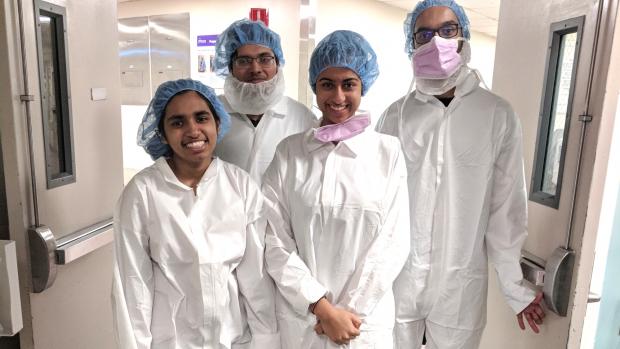Student Researchers Investigate the Environmental Costs of Healthcare

Undergraduate engineering students don sterile, disposable suits to conduct their medical-waste audits as part of their Summer Research program.
Perhaps the last thing on any patient’s mind are the environmental ramifications of the medical procedures they are undergoing. Few people in the midst of getting blood drawn would think of how many pairs of disposable gloves the lab technician discards in a day, and anyone positioned uncomfortably in a noisy MRI machine will probably be wondering how much longer the test will take, rather than how much energy the unit is using.
Cassandra Thiel, an assistant professor at the NYU Langone School of Medicine in the Department of Population Health, with joint appointments at the Robert F. Wagner Graduate School of Public Service and the Tandon School of Engineering, spends her days thinking of just such issues. “Our current overuse of disposable materials in healthcare settings is unsustainable, and our hospitals and other healthcare facilities have often not been built with energy efficiency in mind,” she says. “The way we practice medicine today has a negative impact on our environment and, in turn, on human health.”
This summer, four engineering students are helping her document and quantify some of those inefficiencies as part of the Undergraduate Summer Research Program.
Dhruvi Joshi (NYU Abu Dhabi, ’20), Purnima Prasad (Tandon ’21), Abdur “Mani” Rehman (NYU Abu Dhabi, ‘19), and Jagan Narayanan Subramanian (NYU Abu Dhabi, ’19) are spending their summer break in the patient care units and surgical suites of NYU Langone Hospital in Brooklyn — collecting data, trying to understand the flow of waste through the hospital, quantifying how resources are being used, speaking to stakeholders to get their input, and taking the first steps in designing ways to mitigate what has long been a little-noticed, under-studied problem.
“It has been an eye-opening experience,” Joshi says. “As a civil engineering major, I never imagined I’d get to see the inner workings of a hospital, and I hadn’t realized that civil engineers could have a role in improving healthcare. This has uncovered an entirely new field of interest for me.”
Rehman, too, found getting a behind-the-scenes glimpse of healthcare one of the highlights of the summer — one that more than made up for the somewhat tedious task of sifting through medical waste to conduct their preliminary waste audit. “Getting to observe in the operating room while a procedure was being performed was incredible,” he says. “I can't imagine I would have ever had the chance to experience that without becoming surgeon or nurse myself.”
From the start, Prasad had been intrigued to see the project listed as part of the Undergraduate Summer Research Program. “I was hospitalized with pneumonia for several weeks as a 14 year old, so the area of healthcare held some personal interest for me,” she recalls. “Beyond that, however, I saw participating as a way to make an impact in an area that deserves more attention. Everyone talks about sustainability, but few researchers have focused specifically on healthcare, as we saw when we looked for existing literature on the topic.”
Thiel, a civil engineer by training, is grateful for the students’ help in compiling data and doing basic research. “This is a very labor-intensive process, and we’re still at the early stages,” she says, “so I hope more civil engineering students will get excited about it and find it gratifying to participate.”
In addition to gaining experience in basic research and data collection — and to having the satisfaction of helping solve a largely overlooked but serious problem — there are other benefits to their summer activity, the students assert. “I’ve learned to be mindful and present,” Subramanian says. “I’m not just a research student performing field and design work to produce a paper. Each person in the hospital is fighting his or her own battle, be it doctors trying to save patient lives or patients giving everything they have in the operating room or family members supporting their loved ones. Being mindful and present can only increase the quality and value of the products that we design as engineers. The successful integration of technological solutions into everyday life is dependent on the engineer’s ability to understand the society he is working for. There is no shortcut to making a difference!”




